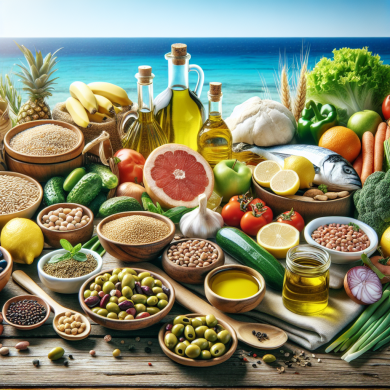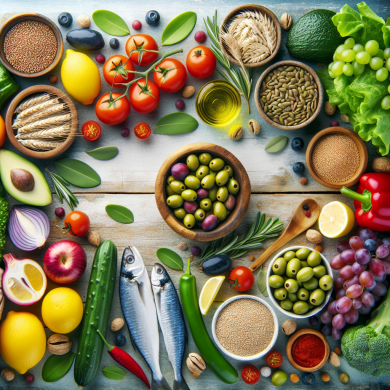Common Mediterranean Diet Mistakes to Avoid
“`html
Understanding the Mediterranean Diet
The Mediterranean Diet is often lauded as one of the healthiest dietary patterns worldwide, inspired by the traditional eating habits of countries bordering the Mediterranean Sea, such as Greece, Italy, and Spain. This diet emphasizes whole grains, fruits, vegetables, legumes, nuts, seeds, fish, and olive oil, while also allowing for modest consumption of poultry, dairy, and red wine. It’s renowned for its benefits in promoting heart health, reducing the risk of chronic diseases, and supporting overall well-being. However, despite its popularity, many people inadvertently make mistakes when trying to adopt this diet, which can undermine its health benefits. Here are some common Mediterranean diet mistakes to avoid.
Overlooking the Importance of Whole Foods
A fundamental aspect of the Mediterranean diet is its focus on whole, minimally processed foods. However, in the quest for convenience, many people fall into the trap of consuming processed foods that are labeled as “Mediterranean.” These might include packaged snacks, processed meats, or pre-made salads with high-calorie dressings. To truly adhere to the Mediterranean way of eating, prioritize fresh fruits, vegetables, whole grains, and legumes. Processed products often contain added sugars, unhealthy fats, and sodium, which can negate the health benefits associated with the diet.
Misunderstanding Olive Oil
Olive oil is a cornerstone of the Mediterranean diet, known for its heart-healthy monounsaturated fats. However, a common mistake is using it excessively or incorrectly. Some people may not realize that, despite its health benefits, olive oil is calorie-dense. Moderation is key; use olive oil to replace less healthy fats, but be mindful of portion sizes. Additionally, some may opt for lower-quality olive oils or those that are not extra virgin. To maximize health benefits, choose high-quality, extra virgin olive oil, preferably cold-pressed, which retains more nutrients and antioxidants.
Neglecting Portion Control
While the Mediterranean diet is rich in healthy foods, it is possible to consume too many calories if portion sizes are not controlled. This is especially true for calorie-dense foods like nuts, seeds, and olive oil. Overeating these can lead to weight gain, which could counteract the positive effects of the diet. To avoid this mistake, focus on mindful eating. Pay attention to hunger cues, and aim to eat until you are satisfied, not stuffed. Incorporating smaller plates can also help manage portion sizes effectively.
Ignoring the Role of Fish
Fish, particularly fatty varieties such as salmon, sardines, and mackerel, are integral to the Mediterranean diet due to their omega-3 fatty acids, which are beneficial for heart health. However, many people do not eat enough fish, either due to personal preference or lack of availability. To fully embrace the Mediterranean diet, aim to consume fish at least twice a week. If fresh fish is hard to come by, consider frozen or canned options, ensuring they are low in sodium and free from unhealthy additives.
Forgetting About Plant-Based Proteins
The Mediterranean diet encourages a variety of plant-based proteins, such as beans, lentils, chickpeas, and nuts, which are rich in fiber and essential nutrients. Some individuals may focus excessively on animal proteins, overlooking these valuable plant sources. Incorporating more plant-based meals not only aligns with the Mediterranean diet principles but also supports sustainable eating practices. Consider replacing some meat-based meals with plant-based alternatives, experimenting with dishes like lentil stews or chickpea salads.
Overconsumption of Red Wine
Red wine is often associated with the Mediterranean diet, but there is a common misconception that more is better. In reality, the health benefits of red wine are only observed with moderate consumption—defined as one glass per day for women and up to two glasses for men. Drinking more than this can increase the risk of health issues such as liver damage and certain cancers. If you choose to include red wine in your diet, do so in moderation and always consider your personal health conditions and medical advice.
Underestimating the Importance of Lifestyle
The Mediterranean diet is not just about food; it is a lifestyle that includes regular physical activity, social connections, and stress reduction. Simply changing your eating habits without embracing these aspects may limit the diet’s potential benefits. Engage in regular physical activities like walking, cycling, or swimming. Take time for meals with family and friends to enjoy the social aspect of eating, and incorporate stress-reducing practices such as meditation or yoga into your routine.
Not Eating a Variety of Foods
Variety is a key component of the Mediterranean diet, which ensures a wide range of nutrients and prevents dietary monotony. However, some people may stick to a limited selection of foods, missing out on the diverse flavors and health benefits. To avoid this mistake, experiment with different fruits, vegetables, grains, and protein sources. Try new recipes and incorporate seasonal produce to keep your meals interesting and nutritious.
Neglecting Hydration
While the focus of the Mediterranean diet is often on food, adequate hydration is equally important. Water is the preferred beverage, and staying well-hydrated supports various bodily functions and overall health. Some individuals may consume sugary beverages or excessive amounts of fruit juices, which can lead to increased calorie intake. To stay hydrated, prioritize water, herbal teas, and limit sugary drinks.
Conclusion
The Mediterranean diet offers numerous health benefits, but common mistakes can prevent individuals from fully reaping these rewards. By emphasizing whole foods, moderating portion sizes, understanding the role of olive oil, and incorporating a variety of plant-based and fish proteins, individuals can successfully adopt this diet. Additionally, integrating lifestyle factors such as physical activity and social engagement enhances the overall impact of the Mediterranean way of eating. By avoiding these common pitfalls, you can embrace a truly healthful and balanced Mediterranean diet that supports long-term well-being.
“`















Add comment